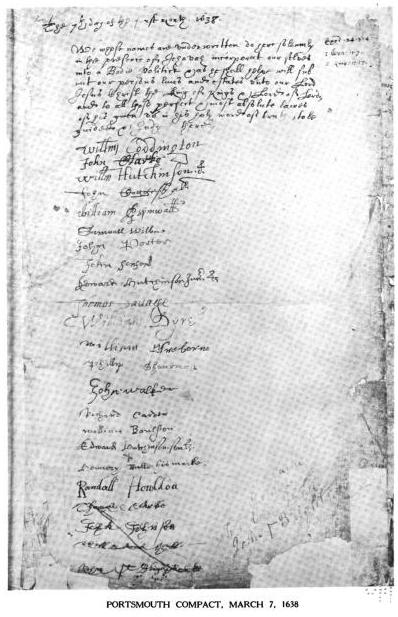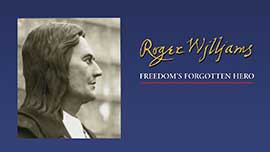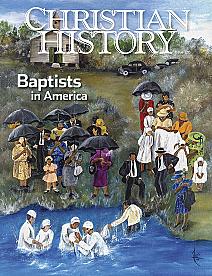JOHN CLARKE IS THE TRUE FOUNDER OF AMERICAN DEMOCRACY

[Above: John Clarke's signature on the Portsmouth Compact, 7 March 1638. Thomas Williams Bicknell, Story of Dr. John Clarke: the founder of the first free commonwealth of the world on the basis of "full liberty in religious concernments," (Providence, RI: Self Published, 1915), at pg. 96]
In 1620, the Pilgrims left England to practice their Puritan faith in the New World. Boston soon became their leading city. By 1637, Boston seethed with disagreements over grace versus works—living faith versus formal orthodoxy. More was at stake than theology. The quarrel involved toleration versus conformity, organization of civil society, and women’s rights. The works faction forced the grace faction out of public office, silenced them, confiscated their weapons, and banished many.
Dr. John Clarke arrived in Boston in 1637. He was well-educated and a strong believer in the religious liberty he had experienced in Holland. At once he got into trouble for defending Anne Hutchinson, who argued for the covenant of grace. Clarke asked permission for the persecuted families to seek a new place to live. Massachusetts granted his request. The banished folk settled in Rhode Island. Roger Williams, an earlier exile from Massachusetts, welcomed them.
The exiles bought land from the Narragansett at the price the Indians named. Payment was in beads. But the settlers added gifts of clothing, hoes, and wampum (strings or sashes of polished shells). Clarke had a hand in founding both Portsmouth and Newport. In 1644, he became the founder and pastor of First Baptist Church at Newport.
In 1651, Massachusetts arrested Clarke because he preached in its territory while on business. Seized with him were John Crandall and Obadiah Holmes. Judges commanded each to pay a fine or be whipped. Clarke won his freedom on appeal; Crandall paid his fine; but Holmes refused to pay, saying to do so would be to admit he had done wrong. He was given thirty lashes and was in such pain he had to crouch on hands and knees, unable to rest against any other part of his body.
Abuse of that sort was unknown in Rhode Island which practiced self-government and soul liberty (the right of individual conscience). The colony even accepted Quakers, whose doctrines other Protestants considered unorthodox. Civil authority was weak, however, and the place was close to anarchy. William Coddington gained power, overturning a charter Roger Williams had obtained in 1644. In 1652, Clarke and Williams sailed to England and got the charter restored. Clarke remained in London to defend Rhode Island’s interests.
When the Restoration ended the Commonwealth in 1660, Rhode Island’s 1644 charter was void. Clarke recognized that Rhode Island needed a law that would secure its liberties.
For the next three years he lobbied for a comprehensive charter. King Charles II granted it in 1663. The charter codified the separation of civil and religious power and the freedom of individuals to believe as they chose. It defined Rhode Island’s boundaries and recognized Indian land sales. The charter established a legislature, executive, and judiciary, and provided for military defense.
During his years in London, Clarke practiced medicine. As he had used up all his own resources in Rhode Island’s cause, an admirer had to pay his passage back to New England. He served as an administrator and pastor there until he died on this day, 20 April 1676.
Historian Thomas W. Bicknell summed up Clarke’s profound contribution to freedom with these words:
Prior to the English Revolution of the Seventeenth Century, however, nowhere on the face of the earth and among civilized men, did civil and soul-liberty jointly exist. Its first clear, full, deliberate, organized and permanent establishment in the world can now be distinctly traced to the Colony of Rhode Island, on the island of Aquidneck, in Narragansett Bay, under the leadership and inspiration of Dr. John Clarke, the true Founder.
—Dan Graves
----- ----- -----
For more on the Baptist input, watch Roger Williams: Freedom's Forgotten Hero at RedeemTV
or read Christian History #126, Baptists in America
Roger Williams: Freedom's Forgotten Hero can be purchased at Vision Video.








